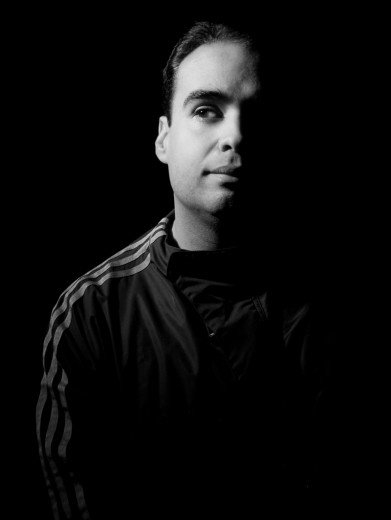Two summers ago we hosted John Tejada at Sunday Best. It was rainy, and so we decided that we should set the system up under the shed. As the day moved forward, it got darker and stormier, and as he stepped up to the table for his live set, people were tight under the makeshift tents and carports we’d strung together.
He worked everyone into a frenzy, expertly playing on the mood that hung in the air — dipping into melodies familiar to his fans and keeping the attention to folks who’d never heard him with perfect dynamics. Needless to say, we’ve been itching to have him back in the city for a long time, and so we’re excited to have him here at Mister Saturday Night this weekend.
We caught up with him earlier today, just before he headed into the garage to pick out some vinyl. Here’s how it went.
Mister Saturday Night: You had an early love affair with hip-hop. What was it about hip-hop that drew you in when you were young? And why did you part ways with it and move on to the music you’re making today?
John Tejada: I got into hip-hop at a really young age. In 1984 i started hearing all these crazy sounds on local radio station KDAY. It was a mix of early electronic pioneers like Chris ‘The Glove’ Taylor, and Egyptian Lover and Juan Atkins’ Cybotron productions. Along with this you had productions from people like Larry Smith, Mantronix and Marley Marl who were working at a slower bpm but [were] equally experimental for the time. It all sounded very electronic and new. As time went on, I was exposed to early Detroit and Chicago electronic music and a tiny bit later the UK’s twist on that. It was an equally exciting to hear all this strange new music. To me, this new music sounded like it came from the same place creatively. So as time went on I gravitated towards the electronic sound more, but it was hip-hop that got me there.
MSN: We’re making a rough estimate here, but it seems like you’ve been part of at least 200 releases — whether as a remixer, producer or musician — in fifteen years. That’s more than one a month for a long, long time. It seems like you’d have to constantly be in your studio to make so much music. Do you ever get to take any time off? What drives you to create as much as you do?
JT: I feel like my music making still happens in my spare time. My collaborations just feel like I’m having fun hanging out with friends. I guess that’s what keeps it fun. The moment it starts feeling like work I just get stuck and it seems pointless.
MSN: In the early 90s, you and your buddy Arian Leviste were both accepted to the Cal Arts electronic music program, but you chose not to go. Why did you make that decision? And what do you imagine your life would be like today if you’d gone?
JT: At the time it didn’t seem like that big of a deal. We were both accepted and chose not to go. I’m actually not sure why he didn’t go. In my case it was more of a financial matter. I felt like OK, I could really struggle to be part of this, while at the same time I was already working in sound design and post production music. So I made the decision between already being in a professional position and trying to learn all I [could] from that opportunity, or go sit in theory and composing classes. I had done some music school programs before that for about 18 months, and that also helped me make my decision. I just felt with the added financial burden and the fact that I felt I was entering the professional workplace already that I should just follow that route. Now years and years later I’ve met and actually worked with people who were in that program that became very close friends even though I didn’t attend. I’m sure going there would have been really fun, but that’s how it turned out.
MSN: You have played New York at many promoters’ parties, in many different spaces and with live and DJ setups. Is there something that stays constant about playing here through all the different scenarios? Is there a characteristic that defines New York for you?
JT: I still can’t put my finger on New York. Perhaps that’s what makes it so appealing. Every visit it almost feels like a different place. That keeps it interesting for me.
MSN: That’s great to hear. The reason we love New York is that it doesn’t stop changing… How about where you’re from, LA? Do you feel like you’re part of a scene there?
JT: After years and years I do finally. The 90s were quite lonely here music-wise. But these days, now that the music is more familiar here, I do feel a part of it and have gotten to meet so many people here now.
MSN: It’s good to feel at home in your hometown… Hey. What’s your favorite taco spot? For the next time we head to the west coast, you know?
JT: That’s a great question and a really hard one to answer. Actually at the moment the new rage are these Korean BBQ taco trucks. I haven’t tried it yet but I keep hearing about it. There is a taco truck on Alvarado in Echo Park that is quite famous. There are always huge lines. Cactus on Vine St in Hollywood is pretty decent for a late night snack. But I’ve yet to have that life changing taco experience here in LA. If you make it out this way you definitely have to check Umami Burger!
MSN: Umami Burger. Noted. We’re looking forward to hearing those records this weekend, John.

Da man!